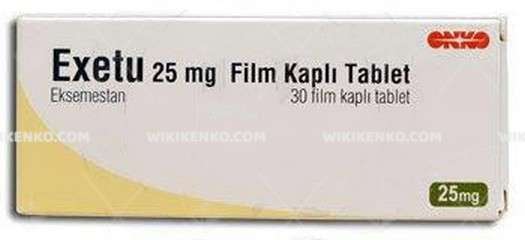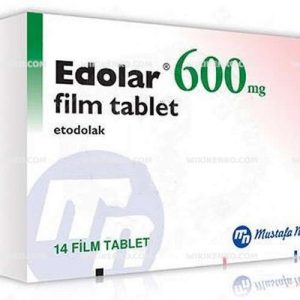Exetu Film Coated Tablet
Exetu stands as a pivotal pharmaceutical formulation, encapsulating 25 mg of Exemestane. This agent, belonging to the third-generation aromatase inhibitors, delineates a critical intervention in the management of hormone-responsive breast cancers amidst postmenopausal women.
| Dosage form | |
|---|---|
| Pack size | |
| Potency | 25 Mg |
| Manufacturer | |
| Origin | |
| Generic Name (Ingredient) | Exemestane 25 Mg |
Assuming your emergency circumstances for this product, visit Urgent Quotation page. Besides, for any pharmaceutical questions, please ask us in the comments section.
Description
Mechanism of Action
Exemestane exerts its therapeutic prowess through the inhibition of the enzyme aromatase, pivotal in the conversion of androgenic precursors into estrogen. In the postmenopausal milieu, the principal source of estrogen stems from the conversion of adrenal and ovarian androgens, facilitated by aromatase. By irreversibly binding to and deactivating aromatase, Exemestane orchestrates a cessation of estrogen synthesis, curtailing the growth stimuli imperative for breast cancer cells.
Therapeutic Applications
The clinical utility of Exemestane extends to diverse arenas within breast cancer management, including:
- Early Breast Cancer: Applicable in cases necessitating estrogen for proliferation, subsequent to prior treatment modalities.
- Advanced Breast Cancer: Following ineffective or ceased tamoxifen therapy, Exemestane serves as a formidable adjunct in thwarting disease progression.
Exetu Tablet Side Effects
Adverse effects associated with Exetu consumption encompass a spectrum of manifestations, notably:
- Insomnia: Perturbation in sleep patterns.
- Headache: A common sequelae across varied therapeutic interventions.
- Nausea: Occurrence of queasiness or emetic episodes.
- Increased Sweating: Augmented perspiration dynamics.
- Musculoskeletal Pain: Incidence of discomfort within bone, muscle, or joint domains.
- Fatigue: Manifestation of heightened weariness or asthenia.
Precautionary Measures
Contraindications to Exetu entail hypersensitivity reactions to Exemestane or its constituents. Prior medical history, encompassing menstrual status, bone health, and hepatic or renal function, mandates meticulous scrutiny to optimize therapeutic outcomes.
Dosage Regimen
Adherence to prescribed dosage parameters mandates oral administration of one 25 mg tablet postprandially, delineating a daily regimen. In instances of missed doses, prompt supplementation within 12 hours mitigates therapeutic lacunae.
Commencement of Therapeutic Action
Exetu’s pharmacodynamic efficacy manifests promptly upon systemic absorption, with an approximate half-life of 24 hours. However, the tangible clinical response may vary, contingent upon diverse patient-centric variables, warranting personalized therapeutic tailoring.
Duration of Therapy
The temporal continuum of Exetu administration underscores its protracted nature, spanning five to ten years in primary breast cancer management. Variability may ensue contingent upon therapeutic nuances and disease trajectory, necessitating judicious clinician oversight.
Alcohol Consumption Caution
While nominal alcohol intake conveys negligible repercussions, concomitant administration with Exemestane incurs potential side effects, ranging from mild to severe sequelae. Prudence dictates abstinence from alcohol or judicious moderation to obviate untoward interactions.
Conclusion
Exetu, heralding the therapeutic prowess of Exemestane, epitomizes a cornerstone in the armamentarium against hormone-responsive breast cancers. Empowered by a nuanced understanding of its pharmacological underpinnings and clinical intricacies, Exetu underscores a paradigmatic shift towards optimized patient-centric care paradigms. Embracing a holistic approach, informed by evidence-based guidelines, ensures the judicious utilization of Exetu, fostering a continuum of therapeutic efficacy and patient well-being.
Composition of Exetu Film Coated Tablet
| Attribute | Description |
|---|---|
| Active Ingredient | Exemestane |
| Dosage Strength | 25 mg |
| Drug Class | Aromatase Inhibitor |
| Therapeutic Application | Breast Cancer Management |
| Route of Administration | Oral |
Use the form below to report an error
Please answer the questions as thoroughly and accurately as possible. Your answers will help us better understand what kind of mistakes happen, why and where they happen, and in the end the purpose is to build a better archive to guide researchers and professionals around the world.
The information on this page is not intended to be a substitute for professional medical advice, diagnosis, or treatment. always seek the advice for your physician or another qualified health provider with any questions you may have regarding a medical condition. Always remember to
- Ask your own doctor for medical advice.
- Names, brands, and dosage may differ between countries.
- When not feeling well, or experiencing side effects always contact your own doctor.
Cyberchondria
The truth is that when we’re sick, or worried about getting sick, the internet won’t help.
According to Wikipedia, cyberchondria is a mental disorder consisting in the desire to independently make a diagnosis based on the symptoms of diseases described on Internet sites.
Why you can't look for symptoms on the Internet
If diagnoses could be made simply from a textbook or an article on a website, we would all be doctors and treat ourselves. Nothing can replace the experience and knowledge of specially trained people. As in any field, in medicine there are unscrupulous specialists, differences of opinion, inaccurate diagnoses and incorrect test results.




Reviews
There are no reviews yet.